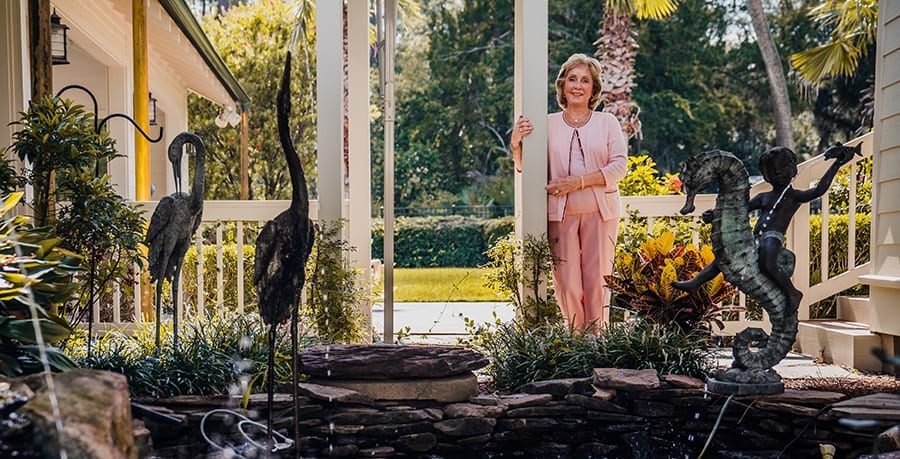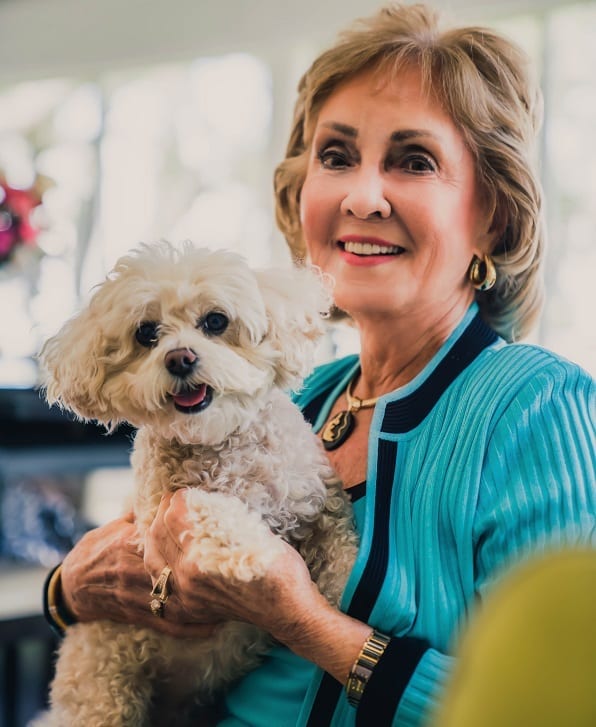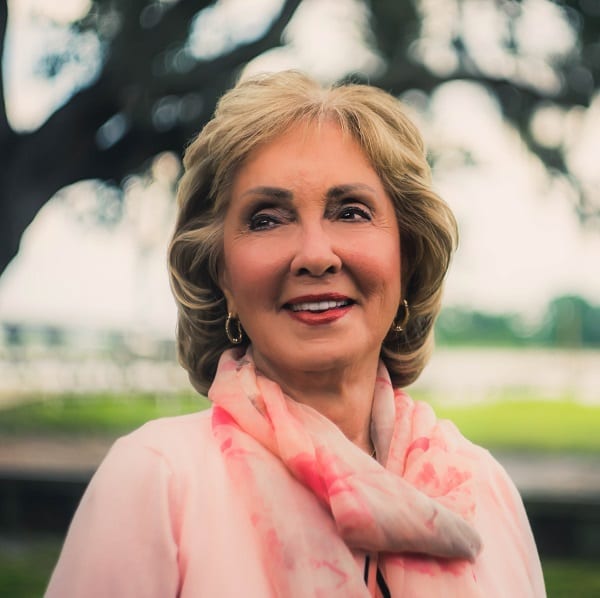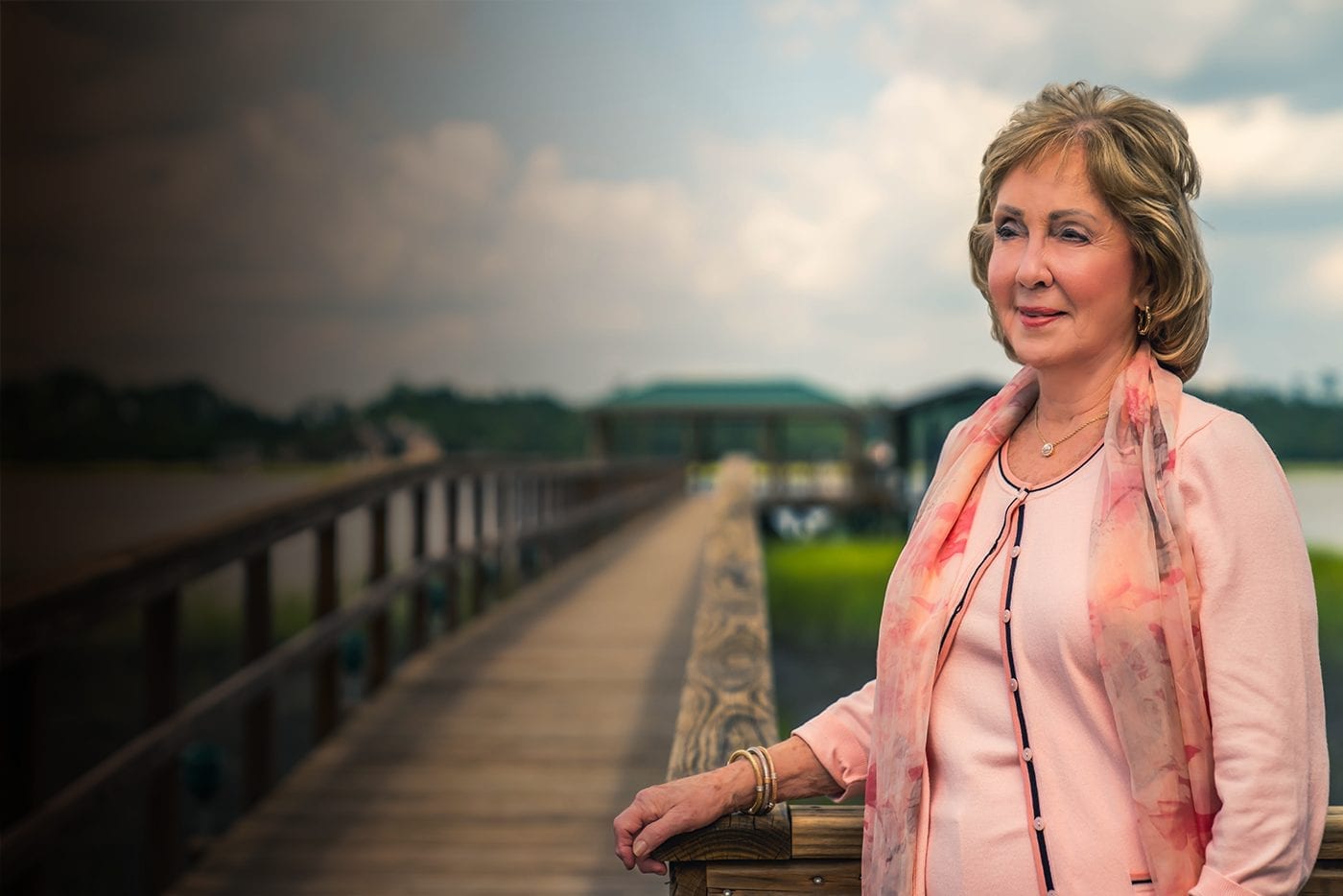Former CEO of Hargray
Gloria Taggart is the former CEO of telecommunications giant Hargray, the company her father started in Hilton Head Island. She guided the business to great success after his unexpected death put the reins in her hands, drawing on his final words to her—“you can do this”—for the courage the task would demand. Under Gloria’s leadership, Hargray would grow to become the 26th largest independent telecommunications company in the U.S.
Today, Gloria continues her lifelong commitment to enriching the Hilton Head Island community through civic engagement and philanthropy focused on local organizations.
Your mother and father started Hargray Utility Co., which you led for over 50 years. Tell me about your parents.
If there was ever a perfect woman, it was my mother. She was a great mother, a great wife, and a great grandmother. She was as sweet as anyone can be. She worked with my father when he first started the phone company in Hardeeville, South Carolina, in 1946 or ’7. She collected the company bills. My dad was from the little town of Fairfax, South Carolina, north of Savannah, where we lived. Back then, families were extremely close. Practically every other weekend, we would visit my grandmother and granddaddy. We always stopped in Hardeeville, and each of us got a candy bar while my dad filled our car with gas. It was just a thrill to get a simple candy bar, which wouldn’t interest a child today at all. My dad became very friendly with the residents there. Some of them he knew because the towns are not that far apart. They knew he was a “telephone man” and would ask, “Why don’t you give us phone service over here?” The only telephone was located at the train station. That struck my dad’s interest, and he started looking into providing small-town telephone service. He decided he would build the telephone company in Hardeeville. It was a hands-on operation with my father doing all the construction of the building himself. He was right in there, laying the concrete between the blocks. Dad, his partner, Mr. Cantrell, and one other phone man did the entire project; they framed and wired up the phones. He and his partner eventually purchased the telephone franchise for the Bluffton, Hilton Head, and Hardeeville areas.
Was your father a visionary?
Very much so. I think for a man who was a cable foreman for Southern Bell, a hard laborer, a person who only attended school to the sixth grade … to envision, to see what he imagined Hilton Head could become, was unreal. Many men with more education and higher positions had the opportunity to provide telephone service to Hilton Head Island, but they lacked the vision. They ignored the opportunity. Somehow my dad had this vision that Hilton Head would become something wonderful one day. He hung on to that dream. At the time, Hilton Head Island was owned by Mr. Fraser and Mr. Hack. They had approached every major telephone company in this part of the world, and not one of them would even consider going into Hilton Head. Then they learned that my father had the phone company in Hardeeville and lived right there in Savannah. They called to have a meeting with him, and after several more meetings, he said yes. He told them he would be willing to do it, but he just didn’t have the funds to do it himself. (He did well just to clothe and feed us.) So Mr. Hack and Mr. Fraser took him to Washington and introduced him to the Rural Electrification Administration (REA). The REA loaned money and helped small utility businesses get started. They approved a loan to my father, and that was the beginning. Mr. Cantrell, his partner, was not in good health. He said, “I live in Bluffton. So, why don’t I take Bluffton and you take Hilton Head?” He said, “I wouldn’t have anything to do with that island. You are going to lose everything you have.” But my dad, with the Frasers’ and Hacks’ help, decided he was going to move forward with the project, and that was the beginning of Hargray.

“ I think for a man who was a cable foreman for Southern Bell, a hard laborer, a person who only attended school to the sixth grade …to envision, to see what he imagined Hilton Head could become, was unreal. Many men with more education and higher positions had the opportunity to provide telephone service to Hilton Head Island, but they lacked the vision.”
![]()
How did the name Hargray come about?
It took my dad about a year and a half to find a name for our company. Someone had already reserved every name he came up with. Then, one day, when I was in Washington with him, he said, “There is one name no one will have reserved. I will take the H-A-R from my last name Harvey, and the G-R-A-Y, which was your mother’s maiden name.” He was correct. No one had reserved the name Hargray. That became the name of the telephone company.
What was it like in the early days?
In the beginning, my father worked heavy construction. It was manual labor. There was only a radio service at the William Hilton Inn. Radio was the only form of communication between the world and Hilton Head Island. There was not even a bridge to the Island. The ferry to Bluffton ran twice a day, going over and coming home. When you went, you prayed you could get back on the ferry to make it home. People were often left on the Island. I want to say it took him a good five years. It was a long process getting all the plans, regulations and approval because Hargray was the first company in the U.S. with our telephone lines placed 100 percent underground. So it was a double challenge: first, to provide service to an island with no bridge, and second, to run underground lines so the island’s beauty was not impacted by poles and cables. Once they determined that it was possible to bury the cable in the ground, he took the challenge. To me this is another example of his vision. Hargray dug and placed every cable; all buried 100 percent. Even today you won’t find any telephone poles on Hilton Head.
How many hours a day did your father work?
From dawn until dark. He worked so very hard for so many years. I would not hesitate to say many weeks he worked more than 80 hours.
For over 50 years you have led and served as the head of Hargray. How and why did this corporate success story begin?
I was a manager of the accounting department at Liberty National Bank in Savannah, Georgia, until my dad’s health began to deteriorate. His passing was a complete surprise to all of us. My father had surgery because of an ulcerated stomach. He was doing beautifully until he developed sepsis, a poisoning throughout his system. For about two weeks he was on death’s doorstep, but he got better. The day before he was to come home, he died very suddenly.
And your whole world…
Fell apart. It was very rough at first. Here I was this female, and I had Charles Fraser, and his dad, a lot of people like them, who were sharp, keen businessmen. At any given moment anyone of them could have cut my head off, with one word probably. It was terrifying. I prayed a lot. I told myself, “I can do this. I’ve just got to do it. I have no choice.” I put my whole heart and soul into it, worked long hours and sat through some scary meetings. After the second year, it became evident that our company was a target, and there was a concerted effort being made to take the company away from us. My dad had passed away, and they probably thought there would not be anyone able to shepherd Hargray into the future. People could see where Hargray was headed; they liked what they saw, and many wanted to own it. I am serious when I tell you this. There were several big attempts to take the company, and one of them scared the living daylights out of me. At one point I thought I just couldn’t fight these people. Then I brought my husband into the organization. I thought, “If we work hard, together, we can make this work. I will show them I can do this.” My college background in accounting helped a lot. I put everything I had, my whole heart and soul, into Hargray. The first three or four years were really hard. I don’t know how, but I did it.

“I put everything I had, my whole heart and soul, into Hargray. The first three or four years were really hard. I don’t know how, but I did it.”
![]()
Were you afraid during those times?
Oh, yes, I was.
How did you calm that fear?
Well, I don’t like to bring religion into things, but I prayed a lot and talked to myself a lot. Talked to my dad a lot. I don’t think I would have made it had it not been for the assurance from my mother and my husband—working together, deciding we would do this. But it was very frightening.
Were there ever times that you wanted to quit?
Yes, ma’am. Many, many, many times I wanted to quit. In fact, I would go home saying, “I can’t do this. I have to give it up. It’s not worth it.” Then I would remember my dad saying, “I know you can do this. You’re my girl. You’ve proven to me that you’re strong and you can handle this job. When I pass away (because I think he knew that he was), I want you to promise me that you’ll take this company and that you will run it to the best of your ability. But, if you see that it is going to make you sick or ruin your life, don’t keep it. Sell it. Promise me that if you keep it five years, you will not let it go. If you can make it to then, you will have it made.” It was very true because after the fifth or sixth year, I finally had got into the swing of things, and we had leveled out. I found my strength and determination and became a tough, tough gal. If it had not been for those initial years, I don’t think I would have made it. I became determined, even a little hardheaded.
Did you know that Hargray was one of the original sponsors of the Concours d’Elegance?
Yes, I did. My husband and I were on the board. He was president of the Concours d’Elegance when it started as a car club and served as its president for several years more. He loved old cars. At the time of his death, I think we had seven. I still have a prestige Rolls Royce and a ’32 truck that’s perfect. We were very active in the Concours d’Elegance for many years, and we thoroughly enjoyed it.

“We were very, very diligent in recognizing local concerns and needs and organizational philanthropy. In the end, Hilton Head Island and the entire area became a great place to live.”
![]()
You are touted as a visionary businesswoman, building a conglomerate of diverse entities. From these hard early years you described, you led Hargray to tremendous success. You built Hargray Telephone Co., Bluffton Telephone Co., Hargray Long Distance, Data Publishing, Hargray Wireless, and then CDG. How did you make the decision to sell this remarkable business and corporate success?
I was getting older. Stress was getting heavier. We had over 400 employees here, not counting the CDG employees, and thousands and thousands of customers. We were growing at such a rapid pace that keeping up was difficult. We were putting more capital into our company than we were making, buying cable just to keep up with customer demand. I could see that we needed to grow, to become what we were capable of. It was more than we could do alone. We lacked adequate capital to continue the growth. We were approached by a company that wanted to purchase us. It became clear that it might be better to sell Hargray to someone who had deep pockets, a company that could keep up with the demand and properly capitalize the growing needs. There was a time in the early days that I did not take a check. We were beginning to get there again because our growth was so fast. Believe me, it was not an easy choice. Because of our diversification, anyone wanting to buy a telephone company was definitely interested in ours. It was very large and had a promising future, and our other businesses made us more than a phone company. We probably would have sold earlier, but my mother kept reminding me of what I had promised my father. If you were to question any employee with Hargray at that time, I don’t believe you would find one that did not recognize what we had accomplished, what we had built. I had a deep love for Hargray. I loved our employees and treated them like my family. They were my family because I had spent the majority of my life there. The time was right though, and we needed to sell it.
Why did you and Hargray give so much back to this community?
I have to think about what the community gave us. The community was good to us. I felt it was only right that you give back to the community that has helped build your company. We were very, very diligent in recognizing local concerns and needs and organizational philanthropy. In the end, Hilton Head Island and the entire area became a great place to live.
Do you miss Hargray?
There is never a day that I don’t miss it. Never a day that goes by that I don’t miss being there. The first year we sold it, I could not drive down Highway 278 and pass the building without crying. Silly as that seems, I did. It took me a good year to get over the sadness. While I don’t miss the stress and the aggravation, I miss our people.

